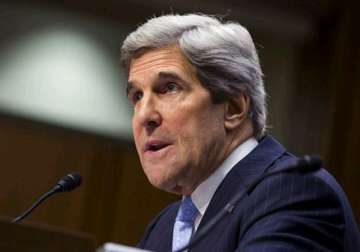Vienna: US Secretary of State John Kerry held talks with the foreign ministers of UAE, Kuwait, Qatar and Bahrain on the Iranian nuclear issue Saturday.
Earlier, Kerry delayed his departure from Vienna in order to hold intensive negotiations with the Iranian foreign minster over the issue, Xinhua reported.
Iran and the five permanent members of the UN Security Council (UNSC) -- the US, Britain, France, China, Russia -- and Germany are trying to reach a nuclear deal with Iran in the Austrian capital Vienna, with only a few days left to reach the deal.
Talks resumed last Tuesday between the P5Ư group of global powers and Iran.
The negotiators are looking for a long-term solution to the decade-old issue of the disputed Iranian nuclear programme, aiming to strike a comprehensive deal by the Nov 24 deadline.
Iran currently has installed 19,000 centrifuges, of which 10,190 are operating. Most of the centrifuges Iran owns are of the old IR-1 type. Iran has also installed around 1,000 IR-2M centrifuges, which are assessed to be three to five times more efficient than the IR-1 centrifuges.
Western states want Iran to significantly lower its number of centrifuges while Iran wants to keep most of its nuclear enrichment capacity. Iran has continued to insist that it has an inalienable right to develop its civilian atomic plan.
A comprehensive deal would ensure that Tehran's atomic plan is exclusively peaceful, while in return, Western states would phase out relevant sanctions which have severely hurt the Gulf nation's oil-dependent economy.
Gaps still remain on some key issues relating to Iran's nuclear programme, which include defining the size and scope of the programme, particularly the number of centrifuges that Iran can operate during the duration of the deal.
Experts said the talks could become more complicated if they are extended further.
Latest World News
